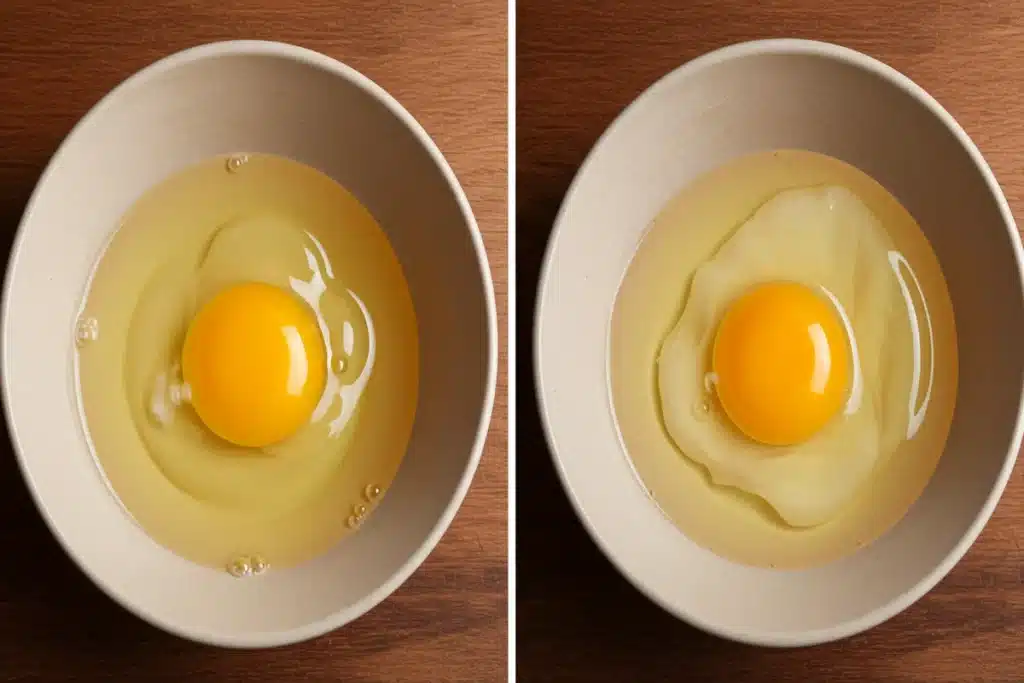Ever asked, why do my eggs come out watery? This article explores common causes for this problem and solutions.
Why do my eggs come out watery? This is a question many home cooks face. Achieving perfectly cooked eggs can be a challenge. This article explains the reasons eggs may become watery. We will look at common cooking errors. We’ll offer practical solutions. Ultimately, this will help you create great egg dishes.
Understanding Egg Composition
Eggs are complex. They are made of water, proteins, and fats. The whites are mainly water and proteins. The yolks have fat and proteins. Therefore, knowing this is essential to understanding why do my eggs come out watery. The water content and protein structure impact how they cook. The composition also affects the final texture.
Whites, Yolks, and Their Water Content
The egg white, or albumen, is mostly water and proteins. The yolk contains fats, proteins and water. Both have water. This water is released when heated. Therefore, the cooking process impacts their final texture. This is also key to learning how to avoid a watery outcome. This understanding is the first step to perfecting your eggs.
Common Cooking Mistakes
Many common errors cause watery eggs. Using high heat is a major factor. Overmixing the eggs also contributes. Additionally, adding too much liquid is a common issue. Therefore, avoiding these errors is key. By being mindful of these cooking steps you will achieve better results. Correcting these will improve your egg dish.
High Heat, Overmixing, and Too Much Liquid
High heat forces the water out of eggs too fast. Overmixing breaks down the protein structure. Furthermore, too much milk, cream, or water dilutes the eggs. These errors all make the final product watery. They also cause the eggs to have a less desirable texture, and taste. Therefore they are best avoided.
The Impact of Overmixing on Egg Texture
Overmixing eggs alters the proteins. The structure of the proteins is broken down, or denatured, causing the liquid to separate. egg structure leads to a less desirable, watery texture. Therefore, it is important to mix gently. You want to combine the whites and yolks just enough. Avoid overdoing it and also avoid mixing for too long.

Protein Structure and Liquid Separation
When eggs are overmixed, the structure of the proteins break down. This change causes the water and solids to separate. This separation causes a less appealing texture. Therefore, always use a light touch. These steps will improve your finished egg dish. You also want to ensure that you are always using fresh eggs.
Cooking Temperature and Its Effect
Cooking eggs at high temperatures often causes them to be watery. High heat forces the water out too quickly. This makes the eggs less creamy. It can also cause them to become tough. Therefore, always use a low or medium heat setting for the best result. This will help create a softer, more pleasant result. Low and slow is the key for perfect results.
Low to Medium Heat for Even Cooking
Using low to medium heat allows for gentle and even cooking. This will stop the water from being forced out too quickly. It also ensures the eggs cook through fully. This prevents them from being runny and also stops them from becoming too watery. These steps are very important. They also ensure that you get the best outcome for your egg dish.
The Problem with Added Liquids
Adding too much liquid to your eggs can also make them watery. Extra milk or water thins the egg proteins. This thinned mixture then separates easily during cooking. Therefore, it is best to use very little liquid. Only use what you need to reach your desired consistency. You always want to use the least amount possible. This also helps keep a good texture.
Using Liquids Sparingly and Controlling Amounts
Too much milk, water or cream will dilute your eggs. The extra water can cause a watery consistency. Always measure the liquid. You can also add your liquid at the end of the cooking process. If you do this, it will also help to retain the texture. This step will also ensure they are not too watery.
Freshness of Eggs and Their Water Content
The freshness of your eggs plays a major role in their water content. Fresh eggs have firmer whites and yolks. Older eggs have looser whites and a watery texture. Therefore, using fresh eggs is essential. It will help you avoid watery eggs. It will also ensure the best possible result. By using fresh eggs, you will have a better base for the dish.

Fresh Whites and Yolks for Better Texture
Using fresh eggs with firm whites and yolks will make a huge difference. Older eggs will have a more watery texture. Therefore, you should always try to use the freshest eggs possible. This will also improve the final results of your cooking. This makes for a better overall breakfast or meal experience.
Cooking Time and the Watery Outcome
Overcooking your eggs will make them watery. When eggs are cooked too long, they will release all their moisture. This forces the water out and creates a dry and watery result. Therefore, cook your eggs only until set. Do not let them overcook. You also want to make sure that they are not undercooked, or runny. Finding that perfect middle ground is essential.
The Right Timing to Prevent Watery Eggs
Cook your eggs just until they are set. This will ensure they are not watery and overcooked. You will also want to make sure that they are not undercooked. When eggs are cooked properly they will be more delicious. Also, they will not have a watery texture. They will also be perfect every single time.
Pan Selection: A Key Factor
The type of pan you use will impact the final result. A non-stick pan is great for eggs. It will allow the heat to distribute evenly. Additionally, it also stops the eggs from sticking. Using the right pan is essential for your egg recipe. It will make the cooking process easier and much more enjoyable. You will also have a more consistent result if you are using the right pan.
Non-Stick Pans for Even Cooking
Use a non-stick pan for cooking. This will ensure even heat distribution. It also stops the eggs from sticking to the pan. Using a good pan for eggs is key for better cooking and more consistent outcomes. This allows for better texture and results. It also ensures a smooth and pleasant cooking process.
Simple Tips to Avoid Watery Eggs
To prevent watery eggs you must use a lower cooking temperature. You also need to mix your eggs gently. Use less liquid, and do not overcook them. Fresh eggs and the right pan are also key. These simple tips will make a huge difference. They will also help you achieve perfect eggs. Following these guidelines will ensure great results every time.

Lower Heat, Gentle Mixing, and Proper Tools
Always cook your eggs at lower temperatures. Always use a gentle hand when mixing them. Also, use the right tools for cooking. These techniques will help you improve your egg cooking process. They also help to avoid watery outcomes.
Exploring Different Egg Dishes
Many egg dishes can be watery if not handled properly. Scrambled eggs can become watery if not cooked correctly. Omelets can also become watery if they are overcooked. You can even make hard-boiled eggs watery if you don’t cook them properly. Each dish needs care. Specific techniques are also essential to ensure they cook correctly.
Scrambled, Omelets, and Hard-Boiled Options
Scrambled eggs, omelets, and even hard-boiled eggs can come out watery. If you don’t use the proper techniques, you might end up with less than perfect results. Each type of egg dish needs specific cooking methods for a perfect outcome. Mastering these different techniques will ensure perfection every time.
Are Watery Eggs Safe to Eat?
Are watery eggs safe to eat? Yes, they are typically safe as long as they are cooked properly. Their taste and texture might be less than ideal. Always make sure that your eggs are cooked fully before you consume them. You will also want to consider how you are cooking them and what steps you should take in the future to avoid that outcome.
Safe Internal Temperature Guidelines
Eggs are safe to eat when cooked to the proper temperature, even if they are watery. However, you still want to make sure that you are following proper cooking guidelines. You also do not want to consume raw eggs. They also might not be as enjoyable with a watery texture. Therefore, always use the correct cooking methods.
Avoiding Watery Eggs with Added Items
Adding ingredients to your eggs can make them watery. Vegetables can release moisture. Therefore, it is key to saute your vegetables first. Additionally, too much dairy or cheese can also create watery results. Therefore, use these items sparingly to avoid having watery eggs. This will help ensure that they come out with the perfect texture.
Pre-Cooking Vegetables and Limiting Dairy
Cook your vegetables before adding them to your eggs. This will help to remove any excess water. Also, use dairy products sparingly. Too much milk or cream will make the eggs watery. By keeping these aspects in mind, you will be able to create the perfect egg dish each and every time. You also do not want to use too much dairy or cheese if that is your preference.
Why are my Cottage Cheese Eggs Watery?
If you add cottage cheese to eggs, you may end up with a watery result. Cottage cheese has a high water content. If you do not drain it well, the excess liquid can cause your eggs to be watery. Make sure that you drain any excess moisture from your cottage cheese before using it. This will help to create a perfect egg dish every time.
Controlling Cottage Cheese Liquid
The liquid found in cottage cheese is a common cause of watery eggs. To prevent this, use a strainer to drain as much liquid as possible. By removing this excess moisture, you will be able to greatly improve your end results. You will also have a better and more delicious outcome, every time you make your recipe.
Frequently Asked Questions About Watery Eggs
Here are some common questions about watery eggs:
Why are my eggs watery?
Your eggs might be watery due to overcooking, using high heat, overmixing, adding too much liquid, or old eggs. You should try to avoid all of these errors. It will also help to ensure that you are using fresh eggs when possible.
What does it mean when egg liquid?
When egg liquid separates, it means the proteins have broken down. This is often caused by high heat or overmixing. This can change the texture of the eggs. It can also cause them to be less appealing. You want to avoid this from happening.
Are watery eggs safe to eat?
Yes, watery eggs are generally safe to eat. However, their texture may be less desirable. Be sure that you have cooked them properly and that they have reached the correct internal temperature.
Why are my cottage cheese eggs watery?
Cottage cheese eggs are often watery if the cottage cheese was not drained well. The cottage cheese has a high liquid content. That liquid must be removed. This step will prevent watery eggs.
Conclusion: Avoiding Watery Eggs
In conclusion, why do my eggs come out watery? Watery eggs are due to common cooking mistakes. These include using too high of heat, overmixing, adding too much liquid, overcooking, and using old eggs. You can avoid watery eggs by using proper methods. Always use a lower heat, mix gently, cook them for the correct time, and prioritize fresh eggs. If you follow these guidelines, you will be able to achieve perfection. This will make your cooking process more enjoyable and satisfying.

